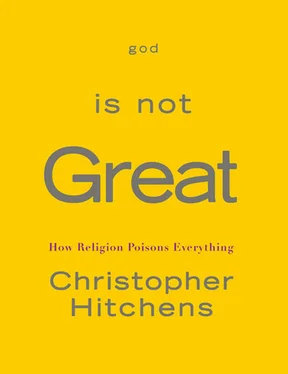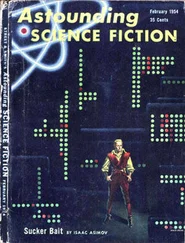CHAPTER NINE
The Koran Is Borrowed from Both Jewish and Christian Myths
The doings and “sayings” of Moses and Abraham and Jesus being so ill-founded and so inconsistent, as well as so often immoral, one must proceed in the same spirit of inquiry to what many believe is the last revelation: that of the Prophet Muhammad and his Koran or “recitation.” Here again, the Angel (or Archangel) Gabriel is found at work, dictating suras, or verses, to a person of little or no learning. Here again are stories of a Noah-like flood, and injunctions against idol worship. Here again the Jews are the first recipients of the message and the first both to hear it and to discard it. And here again there is a vast commentary of doubtful anecdote about the actual doings and sayings of the Prophet, this time known as the hadith.
Islam is at once the most and the least interesting of the world’s monotheisms. It builds upon its primitive Jewish and Christian predecessors, selecting a chunk here and a shard there, and thus if these fall, it partly falls also. Its founding narrative likewise takes place within an astonishingly small compass, and relates facts about extremely tedious local quarrels. None of the original documents, such as they are, can be contrasted with any Hebrew or Greek or Latin texts. Almost all of the tradition is oral, and all of it is in Arabic. Indeed, many authorities agree that the Koran is only intelligible in that tongue, which is itself subject to innumerable idiomatic and regional inflections. This would leave us, on the face of it, with the absurd and potentially dangerous conclusion that god was a monoglot. Before me is a book, Introducing Muhammad , written by two extremely unctuous British Muslims who are hoping to present a friendly version of Islam to the West. Ingratiating and selective as their text may be, they insist that “as the literal Word of God, the Koran is the Koran only in the original revealed text. A translation can never be the Koran, that inimitable symphony, ‘the very sound of which moves men and women to tears.’ A translation can only be an attempt to give the barest suggestion of the meaning of words contained in the Koran. This is why all Muslims, whatever their mother tongue, always recite the Koran in its original Arabic.” The authors go on to make some highly disobliging observations about the Penguin translation by N. J. Dawood, which makes me glad that I have always employed the Pickthall version but no likelier to be convinced that if I wish to become a convert I must master another language. In my own country of birth, I am sadly aware that there is a beautiful poetic tradition, unavailable to me because I will never know the marvelous tongue called Gaelic. Even if god is or was an Arab (an unsafe assumption), how could he expect to “reveal” himself by way of an illiterate person who in turn could not possibly hope to pass on the unaltered (let alone unalterable) words?
The point may seem minor but it is not. To Muslims, the annunciation of the divine to a person of extreme unlettered simplicity has something of the same value as the humble vessel of the Virgin Mary has to Christians. It also possesses the same useful merit of being entirely unverifiable, and unfalsifiable. Since Mary must be presumed to have spoken Aramaic and Muhammad Arabic, it can I suppose be granted that god is in fact multilingual and can speak any language he chooses. (He opted in both cases to use the Archangel Gabriel as the intermediate deliverer of his message.) However, the impressive fact remains that all religions have staunchly resisted any attempt to translate their sacred texts into languages “understanded of the people,” as the Cranmer prayer book phrases it. There would have been no Protestant Reformation if it were not for the long struggle to have the Bible rendered into “the Vulgate” and the priestly monopoly therefore broken. Devout men like Wycliffe, Coverdale, and Tyndale were burned alive for even attempting early translations. The Catholic Church has never recovered from its abandonment of the mystifying Latin ritual, and the Protestant mainstream has suffered hugely from rendering its own Bibles into more everyday speech. Some mystical Jewish sects still insist on Hebrew and play Kabbalistic word games even with the spaces between letters, but among most Jews, too, the supposedly unchangeable rituals of antiquity have been abandoned. The spell of the clerical class has been broken. Only in Islam has there been no reformation, and to this day any vernacular version of the Koran must still be printed with an Arabic parallel text. This ought to arouse suspicion even in the slowest mind.
Later Muslim conquests, impressive in their speed and scope and decisiveness, have lent point to the idea that these Arabic incantations must have had something to them. But if you allow this cheap earthly victory as a proof, you allow the same to Joshua’s blood-soaked tribesmen or to the Christian crusaders and conquistadores. There is a further objection. All religions take care to silence or to execute those who question them (and I choose to regard this recurrent tendency as a sign of their weakness rather than their strength). It has, however, been some time since Judaism and Christianity resorted openly to torture and censorship. Not only did Islam begin by condemning all doubters to eternal fire, but it still claims the right to do so in almost all of its dominions, and still preaches that these same dominions can and must be extended by war. There has never been an attempt in any age to challenge or even investigate the claims of Islam that has not been met with extremely harsh and swift repression. Provisionally, then, one is entitled to conclude that the apparent unity and confidence of the faith is a mask for a very deep and probably justifiable insecurity. That there are and always have been sanguinary feuds between different schools of Islam, resulting in strictly inter-Muslim accusations of heresy and profanity and in terrible acts of violence, naturally goes without saying.
I have tried my best with this religion, which is as foreign to me as it is to the many millions who will always doubt that god entrusted a nonreader (through an intermediary) with the demanding call to “read.” As I said, I long ago acquired a copy of the Marmaduke Pickthall translation of the Koran, which has been certified by senior sources in the ulema, or Islamic religious authority, to be the nearest to an approximate rendition into English. I have been to innumerable gatherings, from Friday prayers in Tehran to mosques in Damascus and Jerusalem and Doha and Istanbul and Washington, D.C., and I can attest that “the recitation” in Arabic does indeed have the apparent power to create bliss and also rage among those who hear it. (I have also attended prayers in Malaysia and Indonesia and Bosnia where there is resentment, among non-Arabic-speaking Muslims, at the privilege granted to Arabs and to Arabic, and to Arab movements and regimes, in a religion that purports to be universal.) I have in my own home received Sayed Hossein Khomeini, grandson of the ayatollah and a cleric from the holy city of Qum, and carefully handed him my own copy of the Koran. He kissed it, discussed it at length and with reverence, and for my instruction wrote in the back-flap the verses which he thought had disproved his grandfather’s claim to clerical authority in this world, as well as overthrown his grandfather’s claim to take the life of Salman Rushdie. Who am I to adjudicate in such a dispute? However, the idea that the identical text can yield different commandments to different people is quite familiar to me for other reasons. There is no need to overstate the difficulty of understanding Islam’s alleged profundities. If one comprehends the fallacies of any “revealed” religion, one comprehends them all.
Читать дальше












